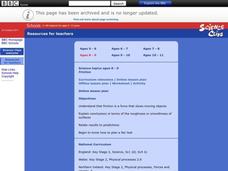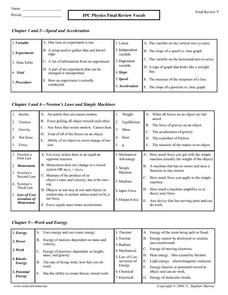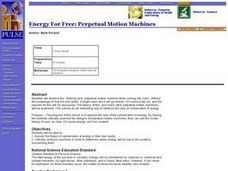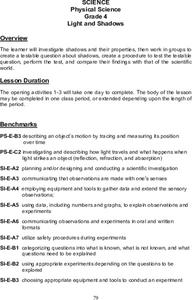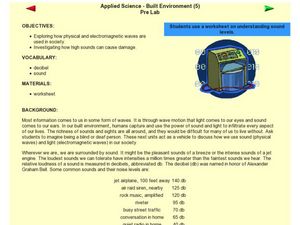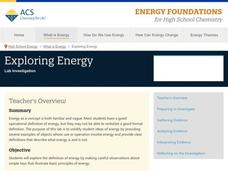Curated OER
When Things Start Heating Up
Young scholars explore how and why heat is produced from things that give off light, from machines, or when one thing is rubbed against another. They participate in several hands-on activities designed to help them realize that heat is...
Curated OER
Newton's 2nd Law
Fourth graders explore Newton's second law of motion, testing and identifying the characteristics of objects that makes them easier or harder to push. They identify what types of objects are the hardest to move, then test a variety of...
Curated OER
Forces in Action
Students investigate questions centered around force and motion by going through the scientific process and creating fair tests and experimentation. In this instructional activity about forces-in-action, students diagram their findings...
Curated OER
Friction
Students compare and contrast the movement of objects on different surfaces, experimenting with friction and forces of motion. This friction lesson has numerous online tools including worksheets and virtual activities; the option is also...
Curated OER
IPC Physics Vocabulary Review
In this physics review worksheet, students review vocabulary words associated with speed, acceleration, Newton's Laws and simple machines, work and energy, magnetism, electricity, and harmonic motion and light. This worksheet has 92...
Teach Engineering
Pushing it Off a Cliff
Focus on the conservation of energy, specifically looking at gravitational potential energy and kinetic energy, with a lecture that involves having friends throw light objects at each other to determine which has more kinetic energy and...
California Department of Education
What Is a "Wave"?
Take a stretch, but don't wave goodbye. An interesting resource provides everything needed to present an introductory lesson plan on waves. Teachers present a PowerPoint defining the types of waves and their characteristics. Pupils use a...
Curated OER
Motion Through the Ages
Eighth graders conduct internet research to produce a timeline of man's growth in understanding of concepts of motion and planetary motion through history.
Curated OER
Simple Harmonic Motion
Students explain the theory of simple harmonic motion (SHM) by performing hands-on, practical application experiments.
Curated OER
Physical Setting: Physics Exam 2004
Twelve pages of mostly multiple-choice questions comprise this comprehensive New York Regents physics exam. It covers an entire year's worth of physics curriculum and requires about three hours for completion. Review the questions to...
Rice University
College Physics for AP® Courses
Take a look at an organized physics course. The 34-section electronic textbook covers material in AP® Physics 1 and 2. Teachers use the text to supplement lectures and have the class work through the labs. Each section contains...
Curated OER
Polarized Light
Students study polarized light and explain how they know it is polarized. In this polarized light lesson students complete a lab that shows them how light can be polarized.
Curated OER
Energy for Free: Perpetual Motion Machines
Students observe the "drinking bird" perpetual motion machine and critically examine the designs of other so-called perpetual motion machines. They use this experience to create their own definition of conservation of energy.
Curated OER
Energy Motion in the Ocean
Students explore the wave energy that is generated and transferred in the ocean. Through the use video and the Internet, students explore the aspects of a wave and how its energy affects the ecology of the seashore.
Curated OER
Light And Shadows
Fourth graders explore the properties of shadows. In pairs they trace each other's shadows in chalk and re-draw their shadow outlines every three hours, design their own shadow investigation, and complete various worksheets related to...
Curated OER
Applied Science - Built Environment (5) Pre Lab
Fifth graders look at the impact of sound and noise. In this sound instructional activity, 5th graders review the decibel and common sounds along with their noise levels. They complete a worksheet about the different sounds that one...
Curated OER
Applied Science -Physics (2B) Pre Lab
Second graders look at different types of energy. In this energy lesson, 2nd graders define energy and the difference between kinetic and potential energy. They see examples with falling books and a slinky.
Curated OER
Free Up the Ketchup!
Students, in teams, use given materials and their knowledge of Newton's First Law to create a device that will remove a sticky ping pong ball from a 16-oz. cup (which represents ketchup stuck in a bottle.)
University of Texas
Lives of Stars
Stars exist from a few million years to over 10 billion years, depending on their mass. Scholars perform a play acting as stars to learn about their different life cycles. They develop an understanding of many of the fundamental concepts...
Curated OER
F = ma, Inertia, and Action-Reaction
Fourth graders apply concepts of Newton's Laws in scientific inquiries. Use this lesson plan to have your charges test and identify the characteristics of objects that make them easier or harder to push. After a teacher-led...
It's About Time
Detect and Induce Currents
Young scientists recreate an 1820 experiment and build off of it to investigate how to detect and induce electrical currents. As a final activity, scholars answer questions in multiple formats.
American Chemical Society
Exploring Energy
When asked to list everyday objects that require energy, most people list technology that use batteries or electricity. Through hands-on exploration, young scientists discover energy is much more than just circuitry. They play with...
Curated OER
Bronx Cheer Bulb
If you chew or make a "raspberry" while viewing an LED light source, the light will appear to wiggle or flicker. It is not because of the light itself, but because of the vibration of your skull! Have your physics class give this a try...
Curated OER
Which Falls Faster?
Second graders study force and what it does. In this motion lesson students complete a demonstration on force and gravity and share their ideas.





